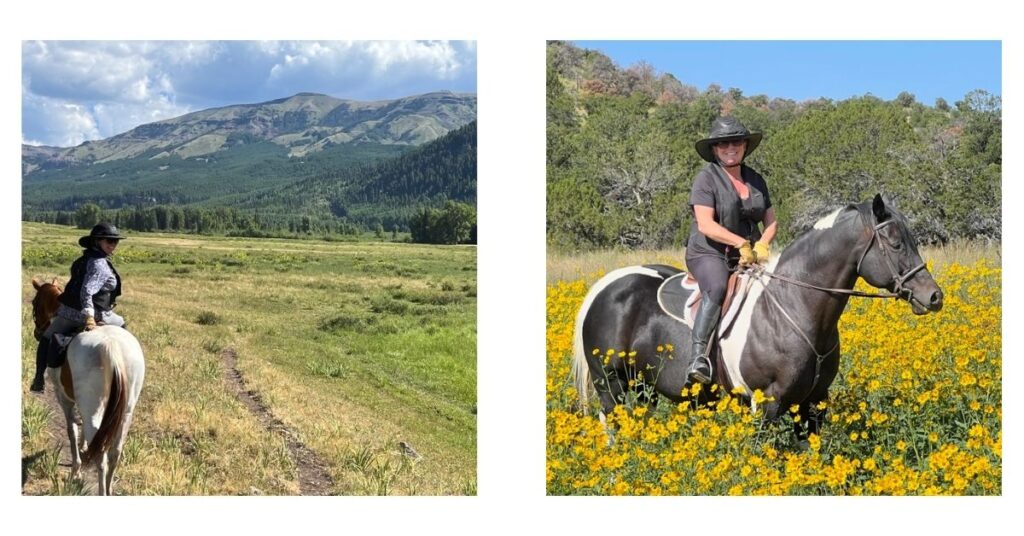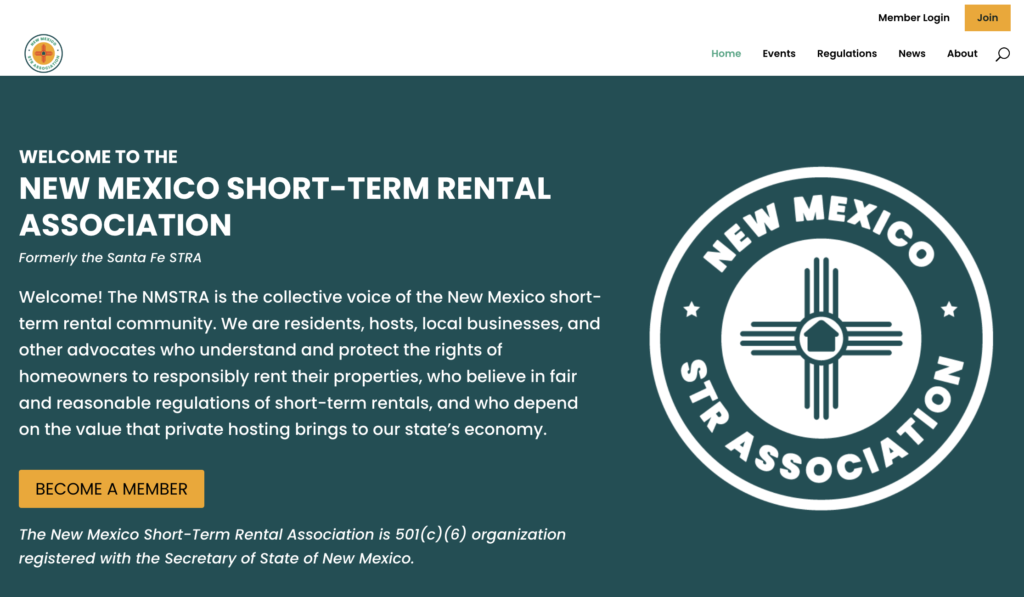Updated on May 23, 2024
Like many STR alliance leaders, Kris Leslie-Curtis was already deeply involved in multiple endeavors before stepping into the role of president of the Santa Fe STRA, which she inherited from founding president Fran Maier. Kris, who was serving on five HOA boards and managing long-term and short-term rentals, initially hesitated to take on the presidency.
“I did so a little reluctantly at that time,” Kris recalled. “But I went ahead and did it, and I’ve continued to lead our group.”
Her primary commitment was to ensure the group achieved 501(c)(6) nonprofit status, which she and fellow board member Gordon Ledingham accomplished in late 2023 – just in time for the organization to take on a bigger challenge.
Defending Santa Fe Short-Term Rentals
Kris’s advocacy journey started before she owned and operated short-term rentals in her hometown of Santa Fe. She moved back to her hometown when her mother was going through the throes of Alzheimer’s. But before that, Kris was still deeply involved in education advocacy in Texas.
With over two decades of experience in early childhood education and tenure as president of the Texas Association for the Education of Young Children, Kris brought expertise in implementing advocacy systems, like having an advocate in place to represent each geographic area and a clear path to leadership advancement.
“Short-term rental advocacy has proved to be like a whole different thing in its way,” Kris said.
“When you look at an educational advocacy organization, you have people that, that is their full-time profession. Short-term rental advocacy has been, roll up your sleeves and get to work. You’re trying to build your board with people that this may not be their full-time profession. Maybe they are hosts on the side, or they have one or two properties. It’s just not as structured as education advocacy.
“That’s why I felt one thing I could contribute is helping to build that structure, by taking all of our dedicated people and saying, Hey, let’s do a 501(c)(6) trade organization; let’s launch this into a professional organization that can support this industry. I didn’t see that it existed in our community. So, I wanted to help facilitate that, because I know that our voice is stronger when we work together.”
Kris’s fight for short-term rental rights is deeply personal, rooted in her family’s background as real estate investors and builders who helped to build the city of Santa Fe.
“My parents were land developers and home builders in Santa Fe,” she said. “So you know, property rights kind of come naturally in the sense of as a family, we believe in advocating for property rights.”
Santa Fe’s decision to enact a cap of one STR permit per person affected her and her family personally. Kris owns two short-term rentals in Santa Fe. She uses income from her short-term rental to pay for her two daughters’ university tuition. Even though her properties were ultimately “grandfathered” in, she continued to rally fellow hosts and allies to oppose the regulations.
One of her childhood hobbies also helped prepare her for her role as host and advocate.
She started riding horses at age 4 and won her first horse show at age 5. She spent much of her childhood and young adulthood riding and showing Hunter-Jumper horses.
“This is a very disciplined sport that requires a lot of hard work, and it instilled in me a very strong work ethic,” Kris said.
She continued riding and showing horses while she raised her own family and has always owned a horse. She still owns three horses and spends her spare time trail riding through Santa Fe’s stunning natural scenery, which includes juniper and pinon-covered hills, aspen and cottonwood groves, pine forests, grassland, and high desert scenery.

“Many years of being a competitive rider taught me the importance of hard work, good communication, interpersonal skills, and attention to detail, all of which are required in the vacation rental industry.”
Going Statewide
Meanwhile, hosts across New Mexico are facing looming threats of tax reclassification and overreaching regulations, putting their livelihoods in jeopardy. An effort underway in the New Mexico Legislature aims to codify cities’ abilities to reclassify short-term rentals as nonresidential, which essentially means the properties can be taxed as commercial.
“The direct consequences are we would lose a 3% residential cap on property taxes per year. So if you’re residential, they can increase your property taxes by only 3%, but under a commercial tax rate, the taxes could increase up to 30% per year,” Kris explained.
Faced with these mounting challenges, Kris and other leaders at SFSTRA recognized that they have short-term rental operators across the whole state that need representation, she said. So, the group decided to take its efforts statewide and officially became the New Mexico Short-Term Rental Association in early May 2024.

The NMSTRA covers all regions across the state and has membership options for hosts and homeowners, property managers, and service providers, such as cleaning companies and landscapers. In addition to advocacy and regulatory updates, the NMSTRA provides general host education, networking, and other benefits in its member portal inside the Rent Responsibly Network.
As the alliance gears up for the upcoming 60-day legislative session, Kris’s newest mission is to secure more funding to hire a paid lobbyist to represent STR operators’ interests at the Legislature.
“We are ready to stand up for the rights of short-term rental hosts in New Mexico,” she said.
Her passion for hosting and her vision for what the NMSTRA will be able to accomplish as a larger organization amid these looming legislative and taxation battles are part of what keeps her motivated in her leadership position as president.
“I look forward to continuing and getting the New Mexico state alliance to a really solid place where we can get prepared for next legislative session but also hope to start to build the structure of an organization where people from each community … represent their town or city on the state board so that we know what’s going on across the whole state and also have a voice up at the state level in trying to affect change across the whole state.”
…


